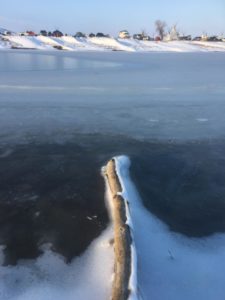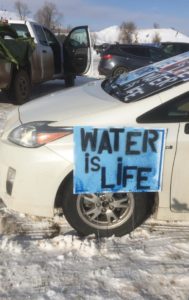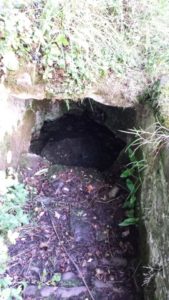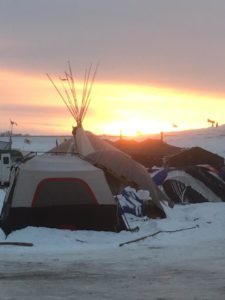Friday, December 2, 2016. Every morning, my wake-up call comes not from the alarm on my phone but from the voices of water protectors 200 yards away, across the Cannonball River chanting, “Mni Wiconi! Water is Life!”

View across the Cannonball River
The words drift across the frozen river, where over 100 people gather at sunrise each day for a water ceremony. Campers on our side of the river stand in silent reverence, watching the ceremony, participating in their own quiet way.
This prayerful start to the day is a reminder that, more than anything, Oceti Sakowin is a spiritual encampment. Especially at the morning water ceremony, but throughout the day, prayers continually circle back to the truth that without water, we are nothing.
Water is so much more important than oil, money or power. Yet face it. Most of us take water for granted, especially if we live in water-rich regions. We turn on the faucet or hose, and voila! We immediately have access to as much water as we want — for pennies.
 Yet people who draw their water directly from the source have a deeper appreciation of its value. Last year when I walked the pipeline route, one of the issues most frequently raised by Iowa farmers was concern over how an oil spill would poison their wells.
Yet people who draw their water directly from the source have a deeper appreciation of its value. Last year when I walked the pipeline route, one of the issues most frequently raised by Iowa farmers was concern over how an oil spill would poison their wells.
I think about this as I listen to “Mni Wiconi, Water is Life” inside the cold, clammy comfort of our tent. I reflect on my own experience with well water as a youth in Ireland. In the 1960s and 70s, every drop of water my Irish uncles and their neighbors used came from a nearby well. No one had running water. Drinking, cooking, bathing, cleaning. All water came from this one well, carried home in buckets.

My Irish well
As a kid, I found our community well a beautiful, magical place. It sat on the side of a small “boreen” — a narrow, grass-covered road used only by cows, sheep and walkers. Centuries ago, someone had built a covered, three-sided stone enclosure to protect the well from the branches and leaves that fell from trees arching above the well.
Every year, someone would clean the well. The water would be drained out, one bucket at a time, until the bottom of the well was exposed. Whatever debris had settled would be removed. Aquatic plants that had taken root were evicted. Limestone would be thrown into the well and the stones white-washed.
Maybe it was my imagination, or maybe it was because harvesting this water required effort, but I always thought that water tasted better than any I’d ever sipped. One of my uncles’ neighbors, Maura Sampey, insisted that it made the best tea. Years later, when piped water was brought in to all the homes in our hamlet, Maura continued to haul buckets of water from the well to make tea.

Sunset at Oceti Sakowin
Water is Life. Water is Sacred. The Oceti Sakowin water ceremony challenges me to reconnect with the spiritual power of water. For me, the life experience that brings that spiritual power home is the well that sustained my uncles, grandparents, great grandparents, and generations of poor farmers before them.
We all have a water story, a magical encounter with the most important substance on Earth. Those stories can help remind us why this fight against an oil pipeline is so profoundly important. What’s your water story? I’d like to hear it.
Mni Wiconi! Water is Life!

I liked your story. The old well sounds like a beautiful place.
I find it very disturbing that you say that the “farmers” worry that oil will pollute their wells when conventional GMO farmers have been doing just that for many DECADES here in Iowa !!!….why can’t we look at that honestly? Bill Stowe is being crucified by farmers and their media allies for fighting for clean water for all of us! Pretty words do not cover up FACTS…and btw, I found no support from you personally when my small family was fighting against egregious behavior from a neighboring farmer…right here in Iowa…maybe you have forgotten our meeting in your office…..how easily you do not look at facts….